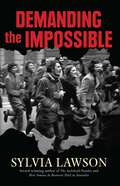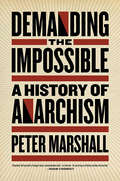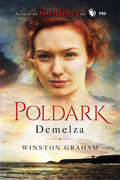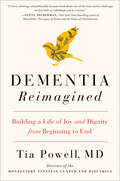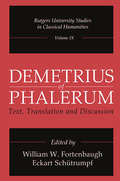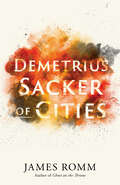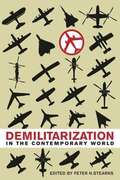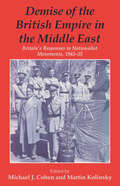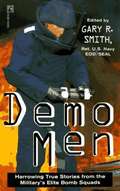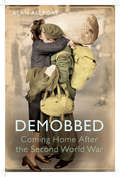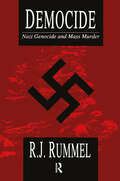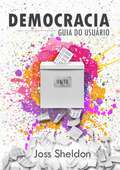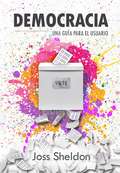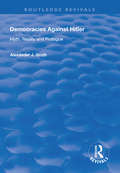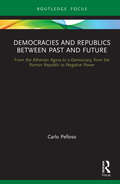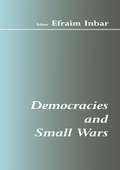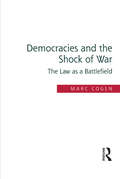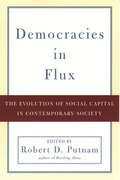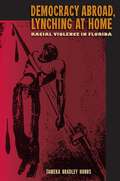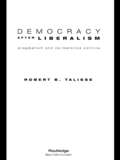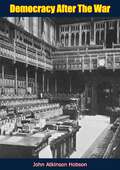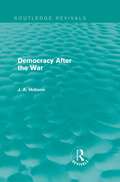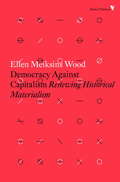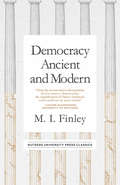- Table View
- List View
Demanding The Impossible: About Resistance
by Sylvia LawsonCombining elements of fiction, history, reportage and analysis, Sylvia Lawson examines the way the spirit of wartime resistance resurfaced in Paris in the insurrection of May 1968, when a rare unity of intellectuals and industrial workers woke a complacent society.She chronicles moments of resistance: the story of intrepid Russian journalist Anna Politkovskaya, who was murdered for her opposition to the Russian oppression of Chechnya; the highly contentious Northern Territory Intervention and Aboriginal dispossession; East Timorese and West Papuan resistance to Indonesian domination.Resistance is about more than protest in the streets; it's about writing and art-making, music and filming, and not least about the way ordinary people keep going.As the Arab Spring unfolds and the Occupy Wall Street initiative has spread round the world, a resistant tradition has been actively inherited: the right to protest and rebel against greed and injustice, to claim public space, to recreate the active, convivial city.
Demanding the Impossible: A History of Anarchism
by Peter MarshallLively and authoritative, this study of a widely misunderstood subject skillfully navigates the rough waters of anarchistic concepts—from Taoism to Situationism, ranters to punk rockers, individualists to communists, and anarcho-syndicalists to anarcha-feminists. Exploring key anarchist ideas of society and the state, freedom and equality, authority and power, the record investigates the successes and failures of anarchist movements throughout the world. Presenting a balanced and critical survey, the detailed document covers not only classic anarchist thinkers—such as Godwin, Proudhon, Bakunin, Kropotkin, Reclus, and Emma Goldman—but also other libertarian figures, such as Nietzsche, Camus, Gandhi, Foucault, and Chomsky. Essential reading for anyone wishing to understand what anarchists stand for and what they have achieved, this fascinating account also includes an epilogue that examines the most recent developments, including postanarchism and anarcho-primitivism as well as the anarchist contributions to the peace, green, and global justice movements of the 21st century.
Demelza: A Novel of Cornwall, 1788-1790 (The Poldark Saga #2)
by Winston GrahamNOW A MASTERPIECE™ SERIES ON PBS®The second novel in the gripping Poldark Saga, a historical fiction series following the life and love of the Poldark family, perfect for fans of Downton Abbey and Outlander.In the enchanting second novel in Winston Graham's beloved Poldark series, Demelza Carne, an impoverished miner's daughter, rescued by Ross Poldark from a fairground brawl, now happily finds herself his wife. But these historic and turbulent years put their romance to the test.As Ross launches into a bitter struggle for the right of the mining communities, Demelza's efforts to adapt to the ways of the gentry (and her husband) challenge her to rethink everything. When tragedy strikes and sows the seeds of rivalry between Ross and the powerful George Warleggan, will Demelza manage to bridge their differences before they destroy her marriage and her chance at happiness?Amid the turbulent history of 18th century England, Demelza continues the Poldark family saga and sweeps readers into one of the greatest historical romances of all time.
Dementia Reimagined: Building a Life of Joy and Dignity from Beginning to End
by Tia PowellThe cultural and medical history of dementia and Alzheimer's disease by a leading psychiatrist and bioethicist who urges us to turn our focus from cure to care.Despite being a physician and a bioethicist, Tia Powell wasn't prepared to address the challenges she faced when her grandmother, and then her mother, were diagnosed with dementia--not to mention confronting the hard truth that her own odds aren't great. In the U.S., 10,000 baby boomers turn 65 every day; by the time a person reaches 85, their chances of having dementia approach 50 percent. And the truth is, there is no cure, and none coming soon, despite the perpetual promises by pharmaceutical companies that they are just one more expensive study away from a pill. Dr. Powell's goal is to move the conversation away from an exclusive focus on cure to a genuine appreciation of care--what we can do for those who have dementia, and how to keep life meaningful and even joyful. Reimagining Dementia is a moving combination of medicine and memoir, peeling back the untold history of dementia, from the story of Solomon Fuller, a black doctor whose research at the turn of the twentieth century anticipated important aspects of what we know about dementia today, to what has been gained and lost with the recent bonanza of funding for Alzheimer's at the expense of other forms of the disease. In demystifying dementia, Dr. Powell helps us understand it with clearer eyes, from the point of view of both physician and caregiver. Ultimately, she wants us all to know that dementia is not only about loss--it's also about the preservation of dignity and hope.
Demetrius of Phalerum: Text, Translation and Discussion (Rutgers University Studies in Classical Humanities)
by Eckart SchütrumpfDemetrius of Phalerum (c. 355-280BCE) of Phalerum was a philosopher-statesman. He studied in the Peripatos under Theophrastus and subsequently used his political influence to help his teacher acquire property for the Peripatetic school. As overseer of Athens, his governance was characterized by a decade of domestic peace. Exiled to Alexandria in Egypt, he became the adviser of Ptolemy. He is said to have been in charge of legislation, and it is likely that he influenced the founding of the Museum and the Library.This edition of the fragments of Demetrius of Phalerum reflects the growing interest in the Hellenistic period and the philosophical schools of that age. As a philosopher-statesman, Demetrius appears to have combined theory and practice. For example, in the work On Behalf of the Politeia, he almost certainly explained his own legislation and governance by appealing to the Aristotelian notion of politeia, that is, a constitution in which democratic and oligarchic elements are combined. In On Peace, he may have defended his subservience to Macedon by appealing to Aristotle, who repeatedly recognized the importance of peace over war; and in On Fortune, he will have followed Theophrastus, emphasizing the way fortune can determine the success or failure of sound policy. Whatever the case concerning any one title, we can well understand why Cicero regarded Demetrius as a unique individual: the educated statesman who was able to bring learning out of the shadows of erudition into the light of political conflict, and that despite an oratorical style more suited to the shadows of the Peripatos then to political combat.The new edition of secondary reports by Stork, van Ophuijsen, and Dorandi brings together the evidence for these and other judgments. The facing translation which accompanies the Greek and Latin texts opens up the material to readers who lack the ancient languages, and the accompanying essays introduce us to important issues. The volume will be of interest to those interested in Greek literature, Hellenistic philosophy, Hellenistic history, and generally to persons captivated by the notion of philosopher-statesman.
Demetrius: Sacker of Cities (Ancient Lives)
by James RommA portrait of one of the ancient world&’s first political celebrities, who veered from failure to success and back again The life of Demetrius (337–283 BCE) serves as a through-line to the forty years following the death of Alexander the Great (323–282 BCE), a time of unparalleled turbulence and instability in the ancient world. With no monarch able to take Alexander&’s place, his empire fragmented into five pieces. Capitalizing on good looks, youth, and sexual prowess, Demetrius sought to weld those pieces together and recover the dream of a single world state, with a new Alexander—himself—at its head. He succeeded temporarily, but in crucial, colossal engagements—a massive invasion of Egypt, a siege of Rhodes that went on for a full year, and the Battle of Ipsus—he came up just short. He ended his career in a rash invasion of Asia and became the target of a desperate manhunt, only to be captured and destroyed by his own son-in-law. James Romm tells the story of Demetrius the Besieger&’s rise and spectacular fall but also explores his vibrant inner life and family relationships to depict a real, complex, and recognizable figure.
Demilitarization in the Contemporary World
by Peter N. StearnsContemporary world history has highlighted militarization in many ways, from the global Cold War and numerous regional conflicts to the general assumption that nationhood implies a significant and growing military. Yet the twentieth century also offers notable examples of large-scale demilitarization, both imposed and voluntary. Demilitarization in the Contemporary World fills a key gap in current historical understanding by examining demilitarization programs in Germany, Japan, Honduras, Guatemala, El Salvador, and Costa Rica. Contributors investigate factors such as military defeat, border security risks, economic pressures, and the development of strong peace cultures among citizenry. Exemplifying the political difficulties of demilitarization in both its failures and successes, Demilitarization in the Contemporary World provides a possible roadmap for future policies and practices.
Demise of the British Empire in the Middle East: Britain's Responses to Nationalist Movements, 1943-55
by Michael J. Cohen Martin KolinskyBritain emerged from World War II dependent economically and militarily upon the US. Egypt was the hub of Britain's imperial interests in the Middle East, but her inability to maintain a large garrison there was clear to the indigenous peoples. These essays track the decline of the empire.
Demo Men: Harrowing True Stories from the Military's Elite Bomb Squads
by Gary R. SmithReaders take a nerve-jangling ride into risky operations where a single mistake is paid for in blood, loss of limbs, or death. From savagely simplistic Vietnamese explosives to modern HEAT munitions in Kuwait, this book chronicles a history of heroic and horrific incidents. This is a fascinating salute to a special breed of men who handle death with an iron grip.
Demobbed: Coming Home After the Second World War
by Alan AllportWhat happened when millions of British servicemen were "demobbed"--demobilized--after World War II? Most had been absent for years, and the joy of arrival was often clouded with ambivalence, regrets, and fears. Returning soldiers faced both practical and psychological problems, from reasserting their place in the family home to rejoining a much-altered labor force. Civilians worried that their homecoming heroes had been barbarized by their experiences and would bring crime and violence back from the battlefield. Drawing on personal letters and diaries, newspapers, reports, novels, and films, Alan Allport illuminates the darker side of the homecoming experience for ex-servicemen, their families, and society at large--a gripping story that's in danger of being lost to national memory.
Democide: Nazi Genocide and Mass Murder
by R. J. RummelThis volume is part of a comprehensive effort by Professor Rummel to understand and place in historical perspective the entire subject of genocide and mass murder-what is herein called Democide. It is the third in a series of volumes in which Rummel offers a comprehensive analysis of the 120,000,000 people killed as a result of government action or direct intervention.Curiously, while we have a considerable body of literature on the Nazi Holocaust, we do not have a total accounting-at least not until now with the issuance of Democide. In addition to the quantitative lacunae, there remains a paucity of theoretical information distinguishing the historical descriptive and the anecdotal accounts. This study of Nazi killings in cold blood is a path-finding effort in political psychology.While Rummel does not claim to give a definitive accounting, his explanation for the numbers reached-and they are high-is compelling. In addition, we now have a correlation of information on the murder of diverse groups: Jews, Gypsies, Poles, Ukranians, and even Germans themselves. It is now possible to fathom the Nazi genocidal poiicies-which were collective and which were selective.Rummel's volume is a clear guide to a murky past. It offers the first systematic effort to ascertain the nature and the extent of the Nazi genocide from the point of view of the perpetrator's aims rather than the victims' consequences. This is not a pretty picture, but it is not a partisan one either. The materials are presented in a clinical as well as a systemic fashion.Rummel has a deep sense of the life-saving instincts of individuals and the life-taking propensities of impersonal state machinery. It is thus, a humanistic effort, one that plumbs the effects of the Nazi war-machine on innocents in order to better understand present conditions. Professionals ranging from social scientists to demographers will find this a quintessential effort at political reconstruction.
Democracia: Guia do Usuário
by Joss SheldonDIZEM QUE VIVEMOS EM UMA DEMOCRACIA. SOMOS LIVRES, E, POR ISSO, DEVEMOS SER GRATOS. Quão democráticas são as nossas chamadas “democracias”? Será suficiente apenas eleger os nossos líderes e esperar sentados, indefesos, enquanto eles nos governam como ditadores? De que serve escolher os nossos políticos, se não podemos controlar os meios de comunicação, a polícia ou os soldados? Se devemos obedecer cegamente às ordens dos nossos professores e chefes, tanto na escola quanto no local de trabalho, não é um pouco ingênuo acreditar que somos os donos dos nossos próprios destinos? E se os nossos recursos são controlados por uma pequena conspiração de plutocratas, banqueiros e empresas, podemos afirmar honestamente que gerenciamos as nossas economias? As coisas não poderiam ser um pouco mais, digamos, democráticas? Claro que poderiam! "Democracia: Guia do Usuário", nos mostra como... Nas páginas deste livro repleto de histórias, visitaremos Summerhill, uma escola democrática no Leste da Inglaterra, antes de pararmos no Brasil para conferir a Semco, onde a democracia no local de trabalho é o nome do jogo. Viajaremos para Rojava, para explorar a vida de um exército democrático, e iremos à Espanha, para conhecer a oportunidade dada pelo Podemos à democracia líquida. Viajaremos no tempo para ver a democracia em ação nas sociedades de caçadores-coletores, nas confederações tribais, nas guildas e nos bens comuns. Consideraremos os casos do orçamento participativo, da democracia deliberativa, da contratação colaborativa, das moedas comunitárias, dos empréstimos peer-to-peer e muito mais. A mensagem é clara e concisa: a democracia não precisa ser uma utopia. Temos todas as ferramentas necessárias para governar a nós mesmos.
Democracia: Una Guía Para el Usuario
by Joss SheldonDICEN QUE VIVIMOS EN UNA DEMOCRACIA. QUE SOMOS LIBRES Y DEBERÍAMOS ESTAR AGRADECIDOS. ¿Pero cuán "libres" somos? ¿Cuán democráticas son realmente nuestras denominadas "Democracias"? ¿Es suficiente con elegir a nuestros líderes y luego sentarnos, indefensos, mientras nos gobiernan como dictadores? ¿De qué sirve elegir a nuestros políticos, si no podemos controlar nuestros medios de comunicación, la policía o la milicia? Si debemos seguir ciegamente las órdenes de nuestros maestros y jefes, en la escuela y en el trabajo, ¿no es un poco ingenuo creer que somos los dueños de nuestros propios destinos? Y si nuestros recursos son controlados por una pequeña cábala de plutócratas, banqueros y corporaciones; ¿podemos decir honestamente que nuestras economías están siendo dirigidas por nosotros? ¿No podrían las cosas ser un poco más, bueno, democráticas? ¡Por supuesto que sí! "Democracia: Una guía para el usuario" nos muestra cómo... Dentro de las páginas de este libro lleno de historias, visitaremos Summerhill, una escuela democrática situada en el este de Inglaterra, antes de hacer una parada en Brasil para echar una ojeada a Semco, donde la democracia en el lugar de trabajo es el nombre del juego. Viajaremos a Rojava, para explorar como es la vida en un ejército democrático, y luego nos dirigiremos a España, para ver por qué Podemos está dando una oportunidad a la democracia líquida. Viajaremos atrás en el tiempo, para estudiar la democracia en el la vida diaria de las sociedades de cazadores-recolectores, las confederaciones tribales, los gremios y las comunas. Consideraremos el caso del presupuesto participativo, la democracia deliberativa, la contratación colaborativa, las monedas comunitarias, los préstamos entre pares y mucho más. El mensaje es claro y conciso: La democracia no tiene que ser una quimera. Tenemos todas las herramientas que necesitamos para gobernarnos a no
Democracies Against Hitler: Myth, Reality and Prologue (Routledge Revivals)
by Alexander J. GrothFirst published in 1999, what the confrontation between democracies and Hitlerism tells us about democracy is the subject of this book. It examines the response of political democracies to the phenomenon of Hitlerism, beginning with democracy in Germany itself in the ’20’s and ’30’s, and ending up with Britain and the U.S. in the ’40’s. Contrary to mythology, this response was far more a failure than a success. An iconoclastic treatment, it anticipates the crises of the future..
Democracies and Republics Between Past and Future: From the Athenian Agora to e-Democracy, from the Roman Republic to Negative Power (Routledge Focus on Classical Studies)
by Carlo PellosoDemocracies and Republics Between Past and Future focuses on the concepts of direct rule by the people in early and classical Athens, and the tribunician negative power in early republican Rome – and through this lens explores current political issues in our society. This volume guides readers through the current constitutional systems in the Western world in an attempt to decipher the reasons and extent of the decline of the nexus between ‘elections’ and ‘democracy’; it then turns its gaze to the past in search of some answers for the future, examining early and classical Athens and, finally, early republican Rome. In discussing Athens, it explores how an authentic ‘power of the people’ is more than voting and something rather different from representation, while the examples of Rome demonstrate – thanks to the paradigm of the so-called tribunician power – the importance of institutionalised mechanisms of dialogic conflict between competing powers. This book will be of primary interest to scholars of legal history, both recent and ancient, and to classicists; but also to the more general reader with an interest in politics and history.
Democracies and Small Wars
by Efraim InbarBy their nature, democracies clearly have greater constraints than autocratic regimes on their freedom of action as they have to meet constitutional, legal and moral criteria in their use of force. This collection analyses a number of case studies showing how democracies have won small wars.
Democracies and the Shock of War: The Law as a Battlefield
by Marc CogenOver the course of the twentieth century, democracies demonstrated an uncanny ability to win wars when their survival was at stake. As this book makes clear, this success cannot be explained merely by superior military equipment or a particular geographical advantage. Instead, it is argued that the legal frameworks imbedded in democratic societies offered them a fundamental advantage over their more politically restricted rivals. For democracies fight wars aided by codes of behaviour shaped by their laws, customs and treaties that reflect the wider values of their society. This means that voters and the public can influence the decision to wage and sustain war. Thus, a precarious balance between government, parliament and military leadership is the backbone of any democracy at war, and the key to success or failure. Beginning with the sixteenth- and seventeenth-century writings of Alberico Gentili and Hugo Grotius, this book traces the rise of legal concepts of war between states. It argues that the ideas and theories set out by the likes of Gentili and Grotius were to provide the bedrock of western democratic thinking in wartime. The book then moves on to look in detail at the two World Wars of the twentieth century and how legal thinking adapted itself to the realities of industrial and total war. In particular it focuses upon the impact of differing political ideologies on the conduct of war, and how combatant nations were frequently forced to challenge core beliefs and values in order to win. Through a combination of history and legal philosophy, this book contributes to a better understanding of democratic government when it is most severely tested at war. The ideas and concepts addressed will resonate, both with those studying the past, and current events.
Democracies in Flux: The Evolution of Social Capital in Contemporary Society
by Robert D. PutnamIn his national bestseller Bowling Alone, Robert Putnam illuminated the decline of social capital in the US. Now, in Democracies in Flux, Putnam brings together a group of leading scholars who broaden his findings as they examine the state of social capital in eight advanced democracies around the world. The book is packed with many intriguing revelations. The contributors note, for instance, that waning participation in unions, churches, and political parties seems to be virtually universal, a troubling discovery as these forms of social capital are especially important for empowering less educated, less affluent portions of the population. Indeed, in general, the researchers found more social grouping among the affluent than among the working classes and they find evidence of a younger generation that is singularly uninterested in politics, distrustful both of politicians and of others, cynical about public affairs, and less inclined to participate in enduring social organizations. Yet social capital appears as strong as ever in Sweden, where 40% of the adult population participate in "study circles"--small groups who meet weekly for educational discussions. Social capital--good will, fellowship, sympathy, and social intercourse--is vitally important both for the health of our communities and for our own physical and psychological well being. Offering a panoramic look at social capital around the world, this book makes an important contribution to our understanding of these phenomena and why they are important in today's world.
Democracy
by David A. MossHistorian David Moss adapts the case study method made famous by Harvard Business School to revitalize our conversations about governance and democracy and show how the United States has often thrived on political conflict. These 19 cases ask us to weigh choices and consequences, wrestle with momentous decisions, and come to our own conclusions.
Democracy Abroad, Lynching at Home: Racial Violence in Florida
by Tameka Bradley Hobbs"Hobbs unearths four lynchings that are critical to the understanding of the origins of civil rights in Florida. The oral histories from the victims' families and those in the communities make this a valuable contribution to African American, Florida, and civil rights history."--Derrick E. White, author of The Challenge of Blackness "A compelling reminder of just how troubling and violent the Sunshine State's racial past has been. A must read."--Irvin D.S. Winsboro, editor of Old South, New South, or Down South? Florida is frequently viewed as an atypical southern state--more progressive and culturally diverse--but, when examined in proportion to the number of African American residents, it suffered more lynchings than any of its Deep South neighbors during the Jim Crow era. Investigating this dark period of the state's history and focusing on a rash of anti-black violence that took place during the 1940s, Tameka Hobbs explores the reasons why lynchings continued in Florida when they were starting to wane elsewhere. She contextualizes the murders within the era of World War II, contrasting the desire of the United States to broadcast the benefits of its democracy abroad while at home it struggled to provide legal protection to its African American citizens. As involvement in the global war deepened and rhetoric against Axis powers heightened, the nation's leaders became increasingly aware of the blemish left by extralegal violence on America's reputation. Ultimately, Hobbs argues, the international implications of these four murders, along with other antiblack violence around the nation, increased pressure not only on public officials in Florida to protect the civil rights of African Americans in the state but also on the federal government to become more active in prosecuting racial violence. Tameka Bradley Hobbs is assistant professor of history at Florida Memorial University.
Democracy After Liberalism: Pragmatism and Deliberative Politics
by Robert TalisseThis book critically evaluates liberalism, the dominant attempt in the tradition of political philosophy to provide a philosophical foundation for democracy, and argues for a conception of deliberative democracy to meet this need.
Democracy After The War
by John Atkinson HobsonJohn Atkinson Hobson's 'The Fight for Democracy' looks at the state of British democracy after the First World War, outlining the various forces of capitalism, conservatism, militarism, imperialism, protectionist, and bureaucracy that stood in its way and had been strengthened by the conflict. Contents include: 'How to Break the Vicious Circle', 'The new Economic Situation', 'Two Problems for Labour', 'The Conquest of the State', and 'The Close State v. Internationalism'. John Atkinson Hobson (1858 - 1940) was an English social scientist and economist most famous for his work on imperialism—which notably had an influence on Vladimir Lenin-as well as his theory of underconsumption. His early work also questioned the classical theory of rent and predicted the Neoclassical 'marginal productivity' theory of distribution.
Democracy After The War (Routledge Revivals)
by J. A. HobsonFirst published in 1917, Democracy After the War considers the challenges faced in the development of liberal democracy. Hobson emphasises the power of reactionary forces and their ability to hold back progress, reiterating his view that the crux of the problem lies in the inequalities in income and wealth which led to imperialism. Through analysing the economic foundations of imperialist conflicts, Hobson comes to the conclusion that the success of democracy rests on the recognised importance of personal liberty.
Democracy Against Capitalism: Renewing Historical Materialism
by Ellen Meiksins WoodEllen Meiksins Wood argues that with the collapse of Communism the theoretical project of Marxism and its critique of capitalism is more timely and important than ever. Current intellectual fashions of the left which emphasise 'post-modern' fragmentation, 'difference', contingency and the 'politics of identity' can barely accommodate the idea of capitalism, let alone subject the capitalist system to critique. In this book she sets out to renew the critical programme of historical materialism by redefining its basic concepts and its theory of history in original and imaginative ways, using them to identify the specificity of capitalism as a system of social relations and political power. She goes on to explore the concept of democracy in both the ancient and modern world, examining the concept's relation to capitalism, and raising questions about how democracy might go beyond the limits imposed on it by capitalism.
Democracy Ancient and Modern (Mason Welch Gross Lecture Series)
by M. I. FinleyWestern democracy is now at a critical juncture. Some worry that power has been wrested from the people and placed in the hands of a small political elite. Others argue that the democratic system gives too much power to a populace that is largely ill-informed and easily swayed by demagogues. This classic study of democratic principles is thus now more relevant than ever. A renowned historian of antiquity and political philosophy, Sir M.I. Finley offers a comparative analysis of Greek and modern conceptions of democracy. As he puts the ancient Greeks in dialogue with their contemporary counterparts, Finley tackles some of the most pressing issues of our day, including public apathy, partisanship, consensus politics, distrust of professional politicians, and the limits of free speech. Including three lectures that Finley delivered at Rutgers University, plus two additional essays that further illuminate his thinking, Democracy Ancient and Modern explores the dramatic differences between the close-knit civil society of the ancient Greeks and our own atomized mass societies. By mapping out democracy’s past and its present manifestations, this book helps us plot a course for democracy’s future.
